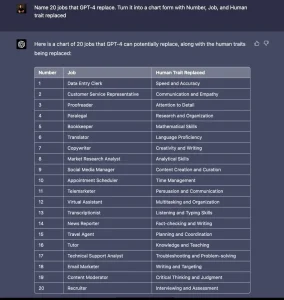Introduction
In the rapidly evolving landscape of artificial intelligence (AI), the role of a prompt engineer has emerged as a pivotal position that bridges the gap between human intent and machine understanding. Prompt engineering involves designing precise instructions or prompts that guide large language models (LLMs) like GPT-4 to generate relevant and useful responses. This role is crucial in ensuring that AI systems deliver accurate outputs that align with user expectations, making prompt engineers essential players in the development and optimization of AI technologies [3][14].
The demand for prompt engineers is on the rise across various sectors, including technology, healthcare, finance, and education. As organizations increasingly adopt AI tools to enhance their operations, the need for skilled professionals who can effectively communicate with these systems has never been greater. Industry projections indicate that the AI sector is expected to grow significantly, with the market potentially reaching a value of $356.10 billion by 2030. This growth translates into a wealth of job opportunities for those looking to enter the field, particularly in roles that do not necessarily require a formal degree [2][12].
One of the most encouraging aspects of pursuing a career as a prompt engineer is that formal education is not a strict requirement. Many individuals can enter this field through self-study, online courses, and practical experience. This accessibility opens the door for job seekers and career changers in tech, allowing them to leverage their creativity, technical skills, and understanding of human psychology to succeed in this dynamic environment [1][7]. As the AI job market continues to expand, aspiring prompt engineers can find numerous pathways to develop their skills and make meaningful contributions to the industry, regardless of their educational background.
Understanding Prompt Engineering
Prompt engineering has emerged as a vital discipline that bridges the gap between human intent and machine output. As AI technologies continue to advance, the role of a prompt engineer becomes increasingly significant, especially for those looking to enter the tech field without a formal degree.
What is Prompt Engineering?
Prompt engineering involves the meticulous crafting and optimization of questions or instructions—known as prompts—to elicit specific, useful responses from generative AI models. These prompts serve as the input that guides AI systems, influencing their behavior and the quality of their outputs. By designing precise prompts, prompt engineers ensure that AI generates relevant and actionable responses, making this role essential in various applications across industries [7][14].
Skills Required for Successful Prompt Engineering
To thrive as a prompt engineer, individuals should cultivate a diverse skill set that includes:
- Natural Language Processing (NLP) Knowledge: A strong understanding of NLP is crucial, as it helps engineers comprehend how AI models interpret language and context [5][12].
- Technical Proficiency: Familiarity with AI technologies and tools is necessary to effectively craft and test prompts [8].
- Creativity and Problem-Solving: The ability to think creatively and approach problems from different angles is vital for developing innovative prompts that yield optimal results [8].
- Ethical Considerations: Understanding ethical AI practices, including bias and fairness, is important to ensure that prompts do not lead to harmful or unintended consequences [1][12].
Industries and Applications Where Prompt Engineering is Critical
Prompt engineering plays a crucial role across various sectors, including:
- Healthcare: In medical AI applications, prompt engineers help design prompts that guide AI in providing accurate diagnoses or treatment recommendations based on patient data.
- Finance: Financial institutions utilize AI for risk assessment and fraud detection, where well-crafted prompts can enhance the accuracy of AI predictions and analyses.
- Marketing: In digital marketing, prompt engineers create prompts that enable AI to generate compelling content, analyze consumer behavior, and optimize advertising strategies.
- Education: AI-driven educational tools rely on prompt engineering to tailor learning experiences and provide personalized feedback to students.
As the demand for AI expertise grows, the field of prompt engineering presents a unique opportunity for job seekers and career changers. With the right skills and a commitment to continuous learning, individuals can successfully navigate this emerging landscape and contribute to the future of AI technology, even without a formal degree.
The Evolving Landscape of AI Jobs
The rapid advancement of artificial intelligence (AI) technologies is reshaping the job market, creating a plethora of new opportunities for individuals looking to enter the tech industry, even without a formal degree. Here are some key points to consider regarding this evolving landscape:
- Rise of AI Technologies: The proliferation of AI technologies has led to significant job creation across various sectors. As organizations increasingly adopt AI solutions to enhance efficiency and decision-making, the demand for skilled professionals who can navigate and leverage these technologies has surged. This trend is expected to continue, with AI projected to contribute trillions to the global economy in the coming years, thereby opening up numerous job opportunities for those willing to learn and adapt [1].
- Emergence of New Roles: Among the new roles that have surfaced in the AI field is prompt engineering. This position focuses on designing and refining prompts—questions or instructions—to elicit specific responses from AI models. As AI systems become more sophisticated, the need for individuals who can effectively communicate with these models has become paramount. Prompt engineers play a crucial role in ensuring that AI outputs are relevant and useful, making this a highly sought-after skill in the job market [2][3].
- Importance of Adaptability and Continuous Learning: In this dynamic field, adaptability and a commitment to continuous learning are essential. The landscape of AI is constantly evolving, with new techniques and approaches emerging regularly. Professionals in this space must stay updated on the latest developments and be willing to acquire new skills as needed. This adaptability not only enhances employability but also positions individuals to take advantage of the diverse opportunities that arise as AI technologies advance [4][5].
Building Relevant Skills Without a Degree
The role of a prompt engineer has emerged as a vital position that bridges the gap between human intent and machine understanding. For those looking to enter this field without a formal degree, there are numerous pathways to acquire the necessary skills and knowledge. Here’s how you can build a strong foundation in prompt engineering.
Essential Skills for Prompt Engineering
To thrive as a prompt engineer, you need to cultivate a diverse skill set that encompasses both technical and soft skills. Here are the essential skills required:
- Critical Thinking: The ability to analyze and evaluate information effectively is crucial. Prompt engineers must assess how different prompts can influence AI outputs and refine them for optimal results.
- Creativity: Crafting effective prompts often requires innovative thinking. A creative mindset helps in formulating unique queries that can lead to more accurate and relevant AI responses.
- Technical Understanding: Familiarity with concepts in natural language processing (NLP), machine learning (ML), and programming languages, particularly Python, is essential. Understanding how AI models operate will enable you to create better prompts and troubleshoot issues effectively [1][5][8].
Learning Resources
Fortunately, there are numerous online courses, bootcamps, and free resources available to help you acquire these skills:
- Online Courses: Platforms like Coursera, edX, and Udacity offer courses specifically focused on AI, NLP, and programming. Look for courses that cover the fundamentals of AI and practical applications of prompt engineering.
- Bootcamps: Coding bootcamps such as General Assembly or Springboard provide intensive training programs that can help you gain hands-on experience in AI and programming within a short timeframe.
- Free Resources: Websites like Khan Academy, Codecademy, and YouTube offer free tutorials on programming and AI concepts. Engaging with these resources can help you build foundational knowledge without any financial investment [2][4][10].
The Value of Self-Directed Projects and Portfolios
One of the most effective ways to demonstrate your competency as a prompt engineer is through self-directed projects. Here’s how you can leverage these projects:
- Create a Portfolio: Document your projects and the prompts you’ve developed. This portfolio can showcase your ability to work with AI models and your understanding of prompt engineering principles.
- Engage in Real-World Projects: Participate in open-source projects or contribute to AI communities. This not only enhances your skills but also allows you to network with professionals in the field.
- Experiment with AI Tools: Utilize platforms like OpenAI’s GPT or Google’s BERT to practice crafting prompts. Experimenting with different approaches will deepen your understanding of how prompts affect AI outputs and improve your problem-solving skills [3][9][11].
By focusing on these essential skills and utilizing available resources, you can successfully transition into a prompt engineering role without a formal degree. The key is to remain dedicated, continuously learn, and actively engage with the AI community. As the demand for prompt engineers grows, your self-taught expertise can position you as a valuable asset in the tech industry.
Networking and Community Engagement
Networking and community engagement are crucial for aspiring prompt engineers, especially for those without a formal degree. Building a professional network can significantly enhance job prospects and open doors to collaborative opportunities. Here’s how to effectively engage with the AI community and leverage these connections for career advancement.
The Power of Networking
- Job Opportunities: Networking can be a game-changer in the job market. Many positions in AI, including prompt engineering, are filled through referrals and personal connections rather than traditional job postings. Engaging with professionals in the field can lead to insider knowledge about job openings and even direct recommendations, which can be invaluable for those without a degree [2][8].
- Collaborative Projects: By connecting with others in the AI community, you can find opportunities to collaborate on projects that enhance your skills and portfolio. These collaborations can also lead to innovative ideas and solutions that may not have been possible working alone [8][10].
Engaging with the AI Community
- Attend Meetups and Conferences: Participating in AI meetups, workshops, and conferences is an excellent way to meet industry professionals and learn about the latest trends. These events often feature talks from experts, providing insights into the field and opportunities to ask questions and network [6][9].
- Join Online Forums and Groups: Engaging in online communities, such as AI forums and LinkedIn groups, allows you to connect with like-minded individuals and industry leaders. These platforms are great for sharing knowledge, asking for advice, and staying updated on industry developments [3][4][11].
- Participate in Webinars: Online webinars focused on generative AI and prompt engineering can provide valuable learning experiences. They also offer a platform to interact with speakers and attendees, further expanding your network [11][12].
The Importance of Mentorship
- Learning from Industry Leaders: Finding a mentor in the AI field can provide guidance and support as you navigate your career path. Mentors can share their experiences, offer advice on skill development, and help you understand the nuances of prompt engineering [10][12].
- Building Relationships: Establishing a relationship with a mentor can lead to additional networking opportunities. Mentors often have extensive networks themselves and can introduce you to other professionals in the field, enhancing your career prospects [8][10].
Gaining Practical Experience
For those looking to enter this field without a formal degree, gaining practical experience is essential. Here are several strategies to help you acquire the hands-on skills necessary to thrive as a prompt engineer in 2024.
1. Internships, Freelance Projects, and Volunteering
Internships and freelance opportunities are excellent ways to gain real-world experience in prompt engineering. These positions allow you to work on actual projects, providing you with the chance to apply theoretical knowledge in practical settings.
- Internships: Seek out internships with companies that focus on AI development or data science. These positions often provide mentorship and exposure to industry practices, which can be invaluable for your career growth [1].
- Freelance Projects: Platforms like Upwork or Fiverr can connect you with clients looking for prompt engineering services. Taking on freelance work not only builds your portfolio but also helps you develop a diverse skill set [1].
- Volunteering: Consider volunteering for non-profit organizations or startups that need assistance with AI projects. This can be a great way to gain experience while contributing to meaningful causes [1].
2. Participation in Hackathons and AI Competitions
Engaging in hackathons and AI competitions is another effective way to enhance your practical skills. These events often challenge participants to solve real-world problems using AI technologies, including prompt engineering.
- Hackathons: These time-bound events encourage collaboration and innovation. By participating, you can work alongside other tech enthusiasts, learn from their approaches, and refine your prompt engineering skills in a competitive environment [1].
- AI Competitions: Platforms like Kaggle host competitions that allow you to tackle specific AI challenges. These competitions often require you to create effective prompts to guide AI models, providing a hands-on learning experience [1].
3. Creating and Sharing Personal Projects
Building personal projects is a powerful way to demonstrate your expertise in prompt engineering. Not only does this allow you to practice your skills, but it also provides tangible evidence of your capabilities to potential employers.
- Project Development: Start by identifying a problem you are passionate about and develop a project that utilizes AI and prompt engineering to address it. This could be anything from a chatbot to a content generation tool [1].
- Showcasing Your Work: Share your projects on platforms like GitHub or personal blogs. Documenting your process and results not only showcases your skills but also helps you build a professional online presence [1].
By focusing on these strategies, job seekers and career changers can effectively gain the practical experience needed to succeed as prompt engineers, even without a formal degree. The key is to remain proactive, continuously seek opportunities for learning, and showcase your skills to stand out in the competitive AI job market.
Job Search Strategies for Aspiring Prompt Engineers
The demand for skilled professionals, particularly in prompt engineering, is on the rise. For those looking to enter this exciting domain without a formal degree, there are effective strategies to enhance your job search and secure a position. Here are some key points to consider:
Crafting a Standout Resume and Cover Letter
- Tailor Your Documents: When applying for prompt engineering roles, it’s crucial to customize your resume and cover letter to highlight relevant skills and experiences. Focus on your understanding of AI, natural language processing (NLP), and any programming skills, particularly in Python, which is fundamental to AI technology [11][12].
- Showcase Projects: Include any personal or freelance projects that demonstrate your ability to work with AI models. This could involve creating datasets or developing methodologies to solve specific problems in AI [5][10]. Highlighting practical experience can set you apart from other candidates.
- Use Keywords: Incorporate industry-specific keywords related to prompt engineering and AI in your resume and cover letter. This not only helps in passing through applicant tracking systems but also shows your familiarity with the field [10].
Job Boards and Platforms for AI Roles
- Specialized Job Boards: Utilize job boards that focus specifically on AI and tech roles. Websites like AI Jobs Board, LinkedIn, and Indeed often list niche job postings targeting prompt engineering positions [9][7].
- Freelance Platforms: Consider platforms like Upwork and Toptal, which cater to freelance opportunities in tech. These can be excellent starting points to gain experience and build a portfolio [1].
- Networking: Engage with communities on platforms like GitHub, Stack Overflow, and LinkedIn. Networking can lead to job referrals and insights into unadvertised positions in the AI sector [4].
Preparing for Interviews
- Understand the Role: Familiarize yourself with the specific requirements of prompt engineering roles. This includes a deep understanding of AI language models and the ability to articulate how you can contribute to projects [14].
- Technical and Behavioral Questions: Prepare for both technical and behavioral interview questions. Technical questions may assess your knowledge of AI principles and programming skills, while behavioral questions will evaluate your problem-solving abilities and how you work in a team [12][15].
- Mock Interviews: Practice with mock interviews to build confidence. This can help you articulate your thoughts clearly and prepare for the types of questions you might encounter [10].
By implementing these strategies, aspiring prompt engineers can effectively navigate the job market and position themselves as strong candidates in the evolving landscape of AI jobs. With dedication to self-learning and skill development, a rewarding career in prompt engineering is within reach, even without a formal degree.
Conclusion
The role of a prompt engineer is emerging as a vital and lucrative career path. One of the most encouraging aspects of this field is that a formal degree is not a prerequisite for entry. Aspiring prompt engineers can successfully navigate their way into this profession through alternative routes, such as online courses, certifications, and hands-on projects. This flexibility opens the door for many job seekers and career changers in tech who may have felt limited by traditional educational requirements.
To embark on this journey, it is essential to take actionable steps towards building relevant skills. Mastering programming languages, particularly Python, is crucial, as it forms the foundation for understanding natural language processing (NLP) and deep learning models. Engaging in online learning platforms, participating in workshops, and collaborating on real-world projects can significantly enhance your expertise and confidence in the field. Additionally, networking with professionals in the AI community can provide valuable insights and opportunities for mentorship.
The future of AI jobs, including prompt engineering, is bright and full of potential. As businesses increasingly rely on AI technologies, the demand for skilled professionals who can effectively interact with and guide these systems will only grow. By being proactive in your career development and continuously seeking knowledge and experience, you can position yourself as a competitive candidate in this dynamic field. Embrace the challenge, invest in your learning, and take the first steps towards a rewarding career in prompt engineering—no degree required.
Find out more about Shaun Stoltz https://www.shaunstoltz.com/about/
This post was written by an AI and reviewed/edited by a human.



